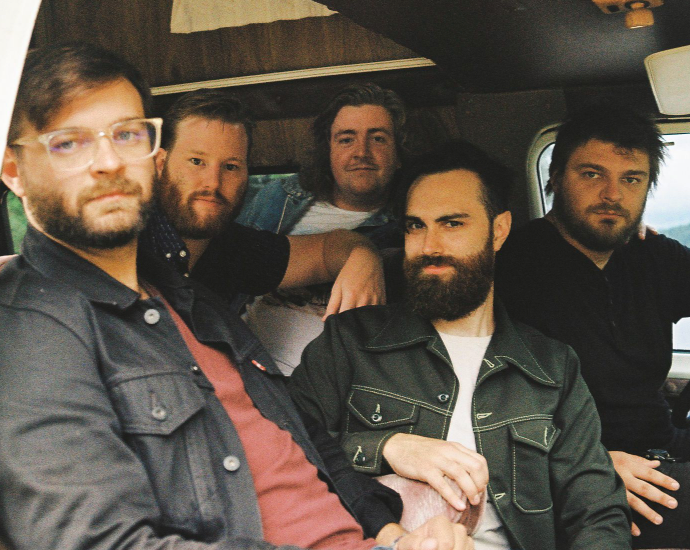Digging into the creative process, Byta speaks with artists, musicians, producers, DJs and anyone involved with music creation. A conversation about how they create, collaborate and share music. From studio setups to routines, and the first person to hear about the next 'big' work.
Where are you based?
We’re Long Range Hustle. Based in Toronto, Ontario. Although, to be more accurate, we’re spread out all across southern Ontario.
How, when and where did you start making music? Are you primarily a musician or a producer, or do something else?
The five of us all come from different backgrounds from being self taught musicians to having a post-secondary degree in music. However, the common trait among us is our desire to perform and write original music.
Paul and Jay both started playing live music in high school coffee houses, where they became friends and developed a mutual admiration for each other’s playing style and obvious proclivity for live performance. For Jay’s 18th birthday, Paul bought tickets to see The Tragically Hip’s show in Kingston. At that point they’d been playing together for a few months, but it was on the drive home, in the afterglow of the magic that is a Hip show, the two decided: Let’s be a real band.
The two went to University of Waterloo together, found a group of friends who played bass, guitar and drums and started playing as much and in as many places as possible across Ontario. Through the years of University the current band lineup fluctuated with some great friends deciding to move onto other non-musical pursuits and the band’s lineup eventually solidified. By the time AJ, Mike and Ryan had all joined, we were ready to record our album Town at The Tragically Hip’s Studio, the Bathouse, in Bath, ON. Inside there a poster was hung for the Tragically Hip show that Paul and Jay went to in highschool that sparked the band’s origin. While there are many points in the journey through which commitment to the pursuit is tested, it was in discovering that poster upon arrival to the studio that we knew we were in the right place.
Who would you consider some of your biggest influences when it comes to your “sound”?
Early in our development we became obsessed with the massive sounding drums and “wall of sound” that Wintersleep’s catalogue offers. We also fell in love with Hey Rosetta!. Paul is a violin player and grew up singing in a choir so we like to mix in strings and orchestral elements to our arrangements. Hey Rosetta! ‘Seeds’ was like an awakening on how a massive sounding rock song can incorporate intricate string arrangements while still sounding cohesive and capture the fervor of the performance.
Since we gravitated and identified deeply with these two bands’, we scoured the liner notes of those albums and noticed that they were both produced by the same guy, Tony Doogan. Once we were ready to record our second record ‘Town’, we threw a hail mary, sent Tony our demos and surprise surprise he agreed to fly over from Scotland and spend a month at the Bathouse in Bath, ON recording ‘Town’ with us. He subsequently has produced our latest album ‘I am alive, but only if you say I am.’ So if we’ve “stolen” any tricks from Wintersleep or Hey Rosetta!, it’s to hire the wonderfully irascible and incredibly kind Tony Doogan.
In working with Tony, we have noticed some of his tricks he used with Wintersleep and Hey Rosetta! ended up on our records. His obsession with getting the right drum sound and incorporating as much room mic within the drum mix as possible creates the massive sound in the final product. He also has a specific way he doubles vocals that really thickens up our choruses in the same way that we hear in Wintersleep’s records.
Explain your creative process? Do you have a routine?
Paul and Jay tend to work on little song ideas and fragments together to flesh out a skeleton to a song. It almost always starts with a melody first, with a handful of lyrics to build on. We’ll take these little ideas to the guys and start to build on them in long form jams. We’ll get together for 2-to-3 day sessions where we hole up and play all day and night. Sometimes we’ll just play a slowly evolving groove for 30 minutes straight, with everyone experimenting until we find something that feels exciting. Once we have a few interesting pieces, we’ll start working on transitions and the details of the arrangement.
What is your “studio” setup?
Throughout the pandemic we’ve all started our own little bedroom studios, mostly using our stage instrument set up with a Scarlett interface, garage band, Rockit 5s and Ableton if we’re feelin’ fancy. However our resident audio engineer/wizard Ryan has a much more legit set up. Meticulously and mathematically spaced monitors, acoustically treated room, Pro Tools (and Logic, which isn’t actually that logical is it?), a Focusrite Saffire Pro 40, but maybe his fave piece of equipment is his Aston Spirit microphone. Works amazing with vocals, acoustic instruments, anything really. Also it looks metal as hell and seems basically unbreakable. He also loves LED lighting all over the place, but who doesn’t these days.
Ryan’s home studio:
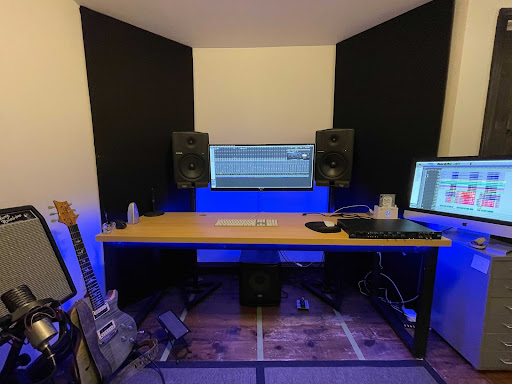
Paul’s home set up:
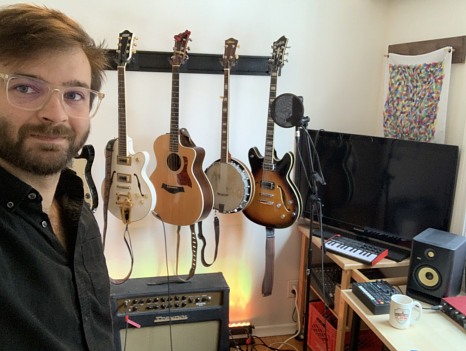
Jay’s home set up:
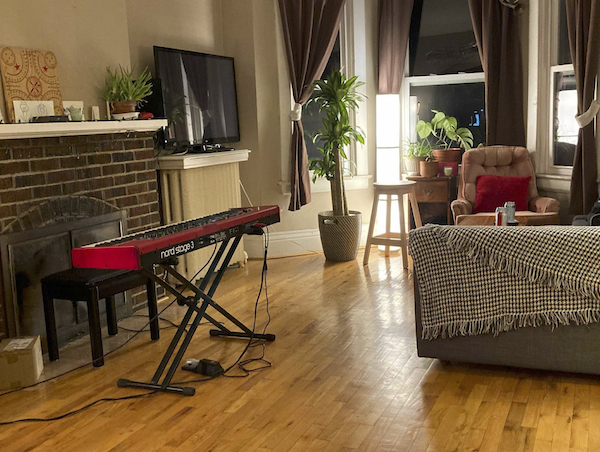
AJ’s home set up:
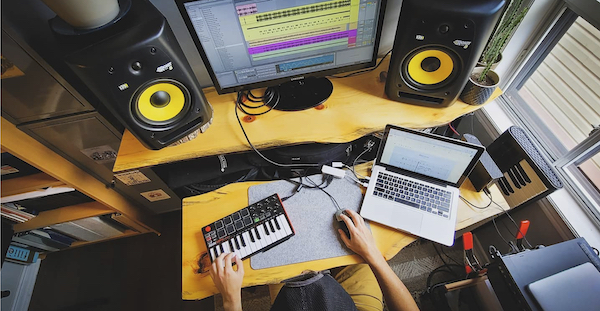
What is your process when working with other people? How is collaboration different in the studio vs working remotely?
Paul and Jay have been writing together since their teen years. We’ll get together and work through song fragments, and help each other develop core progressions, hooks, and lyrics.
As a band, we’re always working collaboratively to some degree, as we jam songs out and experiment with different arrangements. Everyone in the band is a multi-instrumentalist to some degree, so we often come up with ideas and suggestions for each other.
On our upcoming record, we worked with a few extra musicians who contributed cello, trumpet, and additional vocals. We would talk through what we were looking for as a band, and write out some sheet music for them in advance. But once we’re in the studio, we like to get a few takes of them giving their own spin on what we asked for. It makes for a fun, spontaneous atmosphere.
At what point(s) are you comfortable letting other people hear what you are working on?
If we’re sharing within the band or with our manager, they can hear those brutal first phone recordings, it gives inspiration and gets the motor running. But when sharing with peers, we prefer to wait until there is at least a decent mix of the final product. In our early days, we might share an early demo and our friends or family because we’d be so excited about it, but when the album came out they had already had their first impression on an early and admittedly shittier version of the song. That first impression is special, so these days we want it to be the best and most impactful experience possible.
Do you share your work in progress (streams or downloads)? Any technical frustrations?
We don’t share our in-progress work publicly, but we definitely send things back and forth between the band, as well as to our manager. Really early song fragments that Paul and Jay work on are usually recorded as voice memos and the files are just texted back and forth between us. With larger full-band recordings and demos, we upload everything to a google drive. It’s a system that, perhaps surprisingly, has worked quite seamlessly for us.
How do you know when a track/album is finished?
Paul Valéry once said “a work is never finished, but merely abandoned.” I think the trick is knowing when to abandon it in good shape. When you’ve hit a point where the changes you’re making to the writing/production/mix/etc are making the song different but not better, that’s usually the right time to stop.
How do you listen to the final mixes/mastered work?
Prior to the pandemic, we would all gather in person for the mixing and mastering process. It’s a really vibrant and energetic experience to have everyone listening together in the studio. But on our latest record, our producer was working with us remotely from Glasgow. He live-streamed the audio from his studio in Scotland to our own personal spaces in Canada. While some artists will go back-and-forth on mixes, it was important for us to be directly involved in the mixing process. We listened on our home speakers and headphones, and at one point Jay tuned in from his car on the highway.
How important is pre-release security when sharing new work?
We keep most of our stuff locked in to our Google accounts, so we can control the permissions. But that’s more about the convenience for us – we’re not generally security-obsessed people.
Who on your team gets to hear the final versions first and why, what formats do they each need?
Our manager always gets first crack at new recordings – whether in-process or final. We upload all our demos and masters to a private google drive to share amongst the band and her. We’ll also share final versions with our friends/family, and agent/label team members this way.
Outside of your inner circle who are the people that will need to hear the new tracks next?
Journalists, reviewers, and press would be the next logical step for sharing these new songs. Or the upstairs neighbour. Sorry dude, we’ll turn it down.
Anything you are working on, anyone you are working with and want to share?
Our new album “I am alive, but only if you say I am.” is out now! Tony Doogan produced it, Nyles Spencer engineered it and we were lucky to bring with Jill Sauerteig to play Cello on ‘Half Speed’, and Chloe Watkinson came in for some insane vox on ‘Used to Call’. We also had Paul and Mike’s sister Karen Brogee sing some beautiful harmonies on ‘Election Night’. She’s the best of the Brogee fam, so look out. We also had some friends in Sheena Drew Campbell, Sophie Doiron join in on some group harms in ‘American Cash’.

